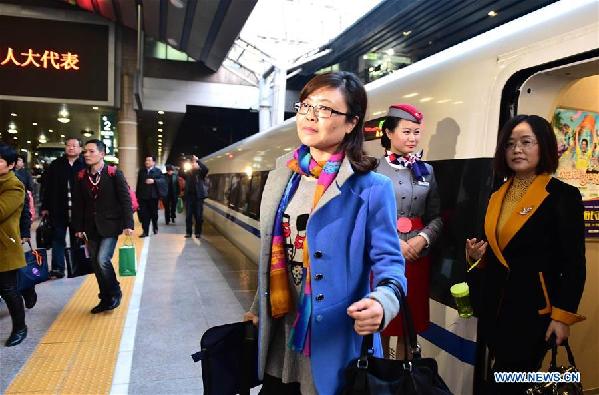Structural reforms and global recovery: after high G20 rhetoric
- By Sumantra Maitra
 0 Comment(s)
0 Comment(s) Print
Print E-mail China.org.cn, March 4, 2016
E-mail China.org.cn, March 4, 2016
|
|
|
Deputies to the 12th National People's Congress (NPC) from central China's Hubei Province get off a train at Beijing West Railway Station in Beijing, capital of China, March 2, 2016. The fourth annual session of the 12th NPC will open on March 5. [Xinhua/Liu Junxi] |
As the readers already know, the Chinese People's Political Consultative Conference (CPPCC), the country's national advisory body, opened its annual session on March 3, and the meeting of the National People's Congress (NPC), the top legislative body, will begin on March 5. Jointly known as the "two Sessions", this follows the G20 meeting, and a Soros warning of Chinese economic "hard landing" in Davos, as well as Dan Drezner's recent essay, which were opposed to the Goldman Sachs analysis just a few days prior.
Neither of those hard predictions of course materialized, as I wrote a couple of columns earlier. It did not amaze me, as a political scientist, that the G20 sessions, held in order to find common structural ideas to increase the percentage of global financial recovery, revealed several ideas which were extremely interesting and topical. It remains to be seen if they are followed through.
Finance ministers and central bank governors agreed on one key point, that providing stimulus is the least useful source of increasing or kick-starting growth rates in some cases. Monetary policies are important to ensure price stability, but in the long run are not effective or permanent stable measures, when compared to structural reforms, and that is an accepted fact for economists and was implicitly accepted in the G20 meeting as well.
Fiscal and structural reforms are the key to bolstering macroeconomic growth and that was highlighted in the meeting. What it didn't highlight was the frustration of bankers at the negative interest rates of Japan and consistent European instability.
The final statement was a win as the Chinese side consistently highlighted the need for structural reforms, and underlined the recent experiences of China in reforming the supply side. The G20 accepted the Chinese Yuan as a global currency, as the IMF accepted China's currency in November, and that was a nod towards the acknowledgement of China's structural reforms by the global economy.
Chinese Premier Li Keqiang urged greater global coordination stating that macroeconomic policy coordination needs to be strengthened. It's an idea shared by the IMF, but which was discarded by Germany and America. Germany's policy makers and finance minister said that talks of a coordinated response are not needed as there might be "other tasks" at hand first, followed by the United States which stated that there is no crisis, only uncertainties, and therefore there is no need for a coordinated crisis response.






